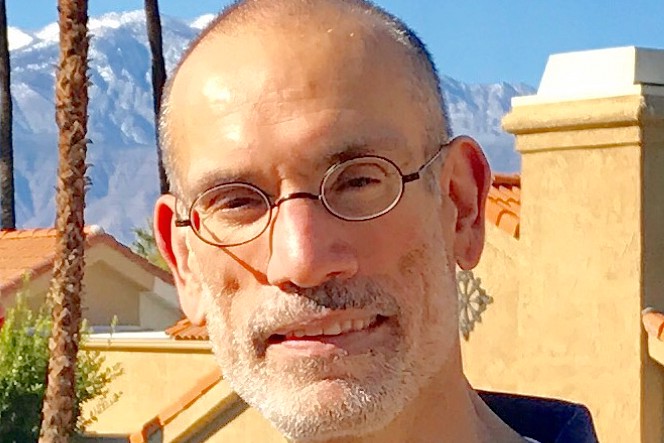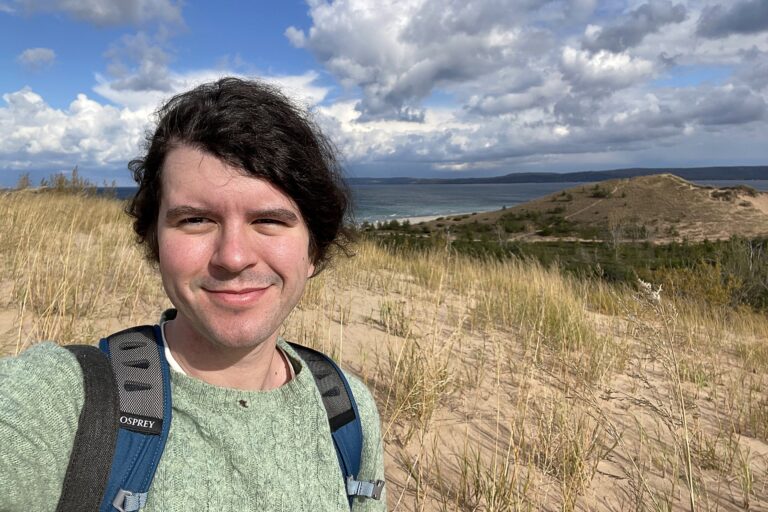Marshall Ross, a senior BFA Acting major, received CREATE! Micro-grant funding to support his SOLO* project, a short-film that follows the experience of a young man living on his own during the Michigan stay-at-home order in the early days of the COVID-19 pandemic. Written, directed, filmed, and acted entirely by Ross on his smartphone, the film explores the impact prolonged social isolation has on the psyche of people affected by anxiety and depression.
“When campus closed, I didn’t move back in with my family, so I was alone in my apartment,” Ross said. “I wanted to find a way to dramatize the experience of being such an extroverted person naturally and having that no longer as an option. My original thought was to make it a dark comedy, but in the end, it’s not at all a comedy.”

The film follows a character named Grant during his experience in isolation. Through his time alone, he must reckon with his devolving struggle with depression, anxiety, social anxiety, and loneliness.
Ross’ interest in film acting has evolved over his two and half years at Michigan State. He has taken Media Acting courses in the Department of Theatre and performed in some short films with other students, but as far as the production end of things, it was the shift to remote learning that drove his love of filmmaking.
“When it comes to editing, I’m entirely self-taught,” he said. “I really got into it once in-person classes stopped, because I was doing videos for all my classes and I wanted to make them all look nice. So, I’d edit them and do color correcting and eventually it turned into my ability to make this film.”
I learned so many new skills along the way and I feel like I proved to myself that I am capable of doing whatever I set my mind to.
The biggest challenge for Ross was the cinematography. He didn’t have anyone to operate the camera and had to mark everything with tape all around his apartment.
“My apartment floor was covered in masking tape,” he said. “Every time I took a shot, I had to record with my phone on a tripod. My microphone was always placed just slightly out of frame. Then, I had to set up the audio, slate everything, and get into the acting mindset and do the actual scene. Then, I would go back to make sure I was actually in frame and I usually wasn’t, so I’d have to go back and do it all again. Just trying to organize all of that was really hard.”
Sound editing was another big undertaking. Ross’ character says few words in the film, but audio elements play a key role throughout the piece. There are two sounds going through the entire film: a white noise sound and a gramma wave bass sound. Those sounds, he says, are used to represent the emotional state of the character throughout the movie.

“If the white noise is high, he’s feeling anxious, and if the gamma waves are high, that’s more of a depressive episode,” Ross said. “They just kind of ebb and flow throughout the entire film until a climax at the end, which is just like a cacophony of chaotic noises.”
Making a film that explores the impact of isolation has on a person with depression and anxiety while Ross himself was socially isolated, created some unintended effects.
“I definitely felt this character leaking into my personal life,” Ross said. “When the character is at the lowest point in the film, I saved those scenes to film last because I was almost scared to film it. He hasn’t eaten in a week, so he’s starving and he’s not able to handle the situation that’s happening around him. The second I wrapped on filming, I felt like a weight had been lifted off my shoulders. I felt so much better.”
The CREATE! Micro-Grant funding afforded Ross some critical support in his ability to sustain artistic creativity during the COVID-19 pandemic.
I submitted my application for the grant on a whim and I definitely knew I was biting off more than I could chew. But I had so much time available to me because of the pandemic and I wanted to now if I had the ability to pull it off.
“I submitted my application for the grant on a whim and I definitely knew I was biting off more than I could chew. But I had so much time available to me because of the pandemic and I wanted to now if I had the ability to pull it off,” he said. “I learned so many new skills along the way and I feel like I proved to myself that I am capable of doing whatever I set my mind to.”
Following graduation in the spring, Ross intends to move to Los Angeles to pursue a career in the film industry.
To hear Marshall discuss his filmmaking process in greater detail, listen to Season 2, Episode 2 of the In the Aud podcast.
The CREATE! Micro-Grant Program selected 12 student projects to each receive $500 to respond critically and imaginatively to events occurring during the COVID-19 pandemic. Those 12 projects, including Ross’ short-film SOLO, can be viewed online through the CREATE! Micro-Grant Virtual Exhibit.
*Please note that the SOLO film may not be appropriate for all ages due to its use of profanity and adult themes.


